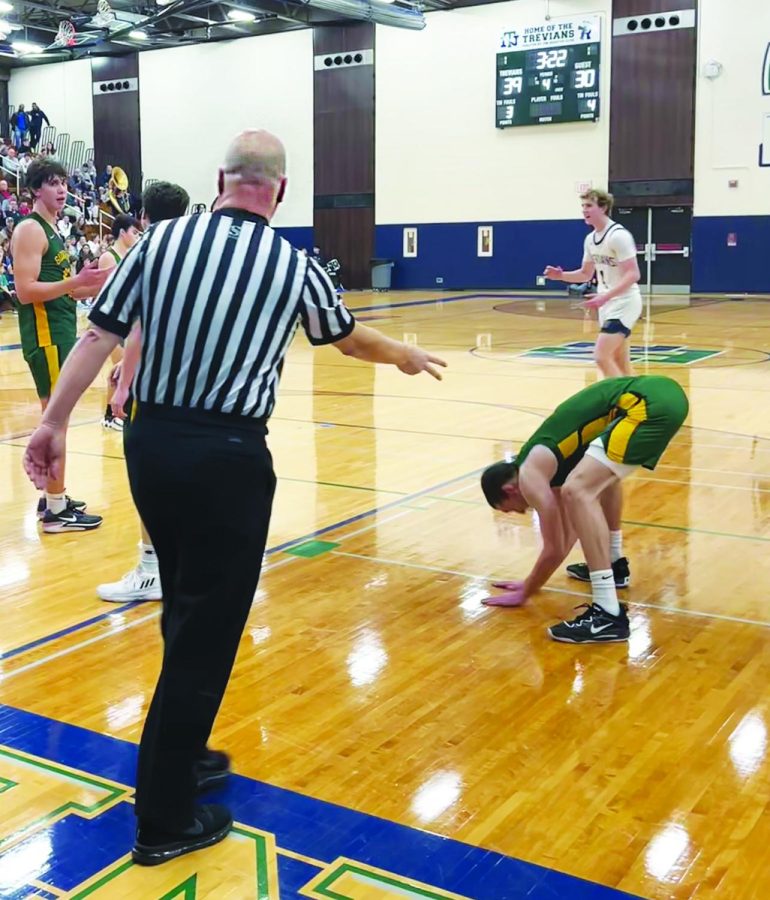Referee shortage plagues IHSA
Aggressive fans, COVID-19 lower retention rates
Minutes into an eighth grade boys feeder basketball game at Maple School, Jeff Schwarz, referee and assignment chairman for boys and girls basketball in the Central Suburban League, was called a racist and a cheater by a coach. After giving the coach a warning and two technical fouls, Schwarz and his fellow referees were confronted by the coach in the parking lot after the game, forcing them to call the police.
“I have been threatened,” said Schwarz. “I’ve had to call the cops on probably six or seven occasions throughout my career.”
The IHSA is facing a referee shortage. Speculation is that the shortage is caused by COVID-19 and abuse towards officials from coaches and fans.
“There’s enough young people that are interested in basketball, whether they’re playing it now or they played it when they were younger that might be interested in officiating,” said Schwarz. “But many of them have seen how their coaches have berated officials, and they’re scared to get into that.”
Two minutes into a frosh/soph girls basketball game at Glenbrook North on Feb. 3, parents from the visiting team began screaming at the referees after they called an offensive foul on one of the visiting team’s players. One parent yelled, “What game are you watching, holy [expletive],” and another yelled, “What was that?” After several more comments from parents, one of the referees approached the parents, asking them to “chill.”
The landscape of sports has changed over the years because of parental involvement and abuse from coaches and fans, said Ken Pink, basketball referee and state clinician for the IHSA.
“Younger officials who are just starting out will work these lower-level youth games, and to have a fan screaming in their ear or a coach screaming in their ear, they may say, ‘What the heck am I doing this for?’” Pink said.
15 and 16-year-olds can now become provisionally licensed referees but can only officiate in youth leagues, junior high and ninth grade contests as of last month.
This rule change was implemented to get younger prospective referees trained and ready for higher level contests, and because of complaints that current referees are too old and immobile, said Donna Mobely, basketball referee on the IHSA’s Athletic Officials Advisory Committee.
“I hate to say it, there’s a lot of complaints about the ages with some of the officials,” said Mobely.“[The rule change] is just to get some newer ones in here that can learn the game before they actually start refereeing.”
According to Schwarz, assignment chairmen, who are responsible for assigning referees to contests, often have trouble finding enough officials to meet each school’s needs.
“What’s happened since [COVID-19] is that some people working the sophomore game have to work varsity and vice versa,” Schwarz said.
For Tony Lombardo, wrestling assignment chairman for the CSL, he has to compete with assignment chairs from other areas when scheduling officials because wrestling matches largely fall on Fridays and Saturdays.
“One of my colleagues, they’ve had to cancel some lower-level events because they didn’t have officials,” said Lombardo. “My experience is that, from what I’ve heard, they’re canceled indefinitely.”
The biggest problem Lombardo faces when assigning referees is the retention rate among them.
“Last year in the Metro area, we signed up 75 new officials, and going into this season, we have only retained about a third, 25,” Lombardo said.
According to Schwarz, although it can feel like a war zone when officiating, there is a great sense of accomplishment in calling a fair game and working with fellow officials.
“What makes you keep [reffing] is you want to stay involved in the game that you love,” said Schwarz.“There’s a thrill with being a part of a big game or a close game. There’s a great sense of camaraderie among officials.”


